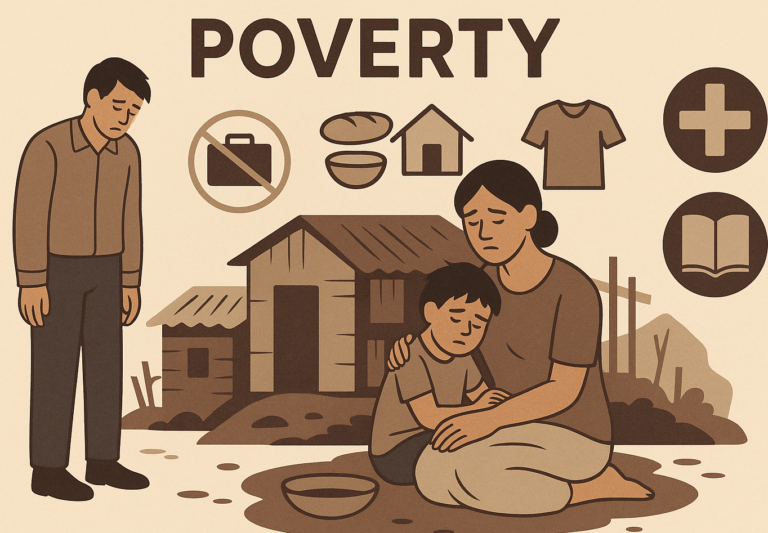Mental Health and Psychological Disorders: An Easy Guide
Mental Health refers to how we think, feel, and behave. It affects how we handle stress, make choices, and relate to others. Psychological disorders, also called mental illnesses, are conditions that affect a person’s mood, thinking, and behavior in ways that can be troubling or harmful to themselves or others.

What is Mental Health?
Mental health is about how well we are mentally, emotionally, and socially. Just like we need to take care of our physical health (like eating healthy and exercising), we also need to take care of our mental health. Good mental health means feeling good about ourselves, being able to cope with stress, and having healthy relationships with others.
When people have poor mental health, they may feel sad, anxious, or worried a lot. They may struggle to manage emotions or face everyday challenges.
What Are Psychological Disorders?
Psychological disorders are conditions that affect the way people think, feel, or act. These disorders can be long-term (chronic) or temporary and may make it harder for someone to function in daily life.
Some common psychological disorders include:
1. Anxiety Disorders
These involve excessive fear or worry that can be hard to control. It’s normal to feel anxious from time to time, but people with anxiety disorders feel it all the time, even in situations that don’t seem scary.
- Examples:
- Generalized Anxiety Disorder (GAD): Constant worry about everyday things, like work, health, or social situations.
- Panic Disorder: Sudden, intense fear that causes physical symptoms like heart racing, sweating, or difficulty breathing.
- Phobias: Extreme fear of specific things or situations, like heights, spiders, or social situations (social anxiety disorder).
2. Depression
Depression is more than just feeling sad. It’s a serious condition that affects how a person thinks, feels, and acts. People with depression often feel hopeless, lose interest in things they once enjoyed, and may have trouble sleeping or eating.
- Symptoms of depression include:
- Persistent feelings of sadness or emptiness.
- Loss of interest in daily activities.
- Difficulty concentrating or making decisions.
- Changes in appetite and sleep patterns.
- Thoughts of death or suicide.
3. Bipolar Disorder
Bipolar disorder involves extreme mood swings between high-energy periods (mania) and deep periods of sadness (depression). People with bipolar disorder can feel very happy or energetic one moment, and then very sad or hopeless the next.
- Symptoms of mania: High energy, feeling unusually happy, racing thoughts, and risky behavior.
- Symptoms of depression: Low energy, feelings of hopelessness, trouble concentrating.
4. Obsessive-Compulsive Disorder (OCD)
OCD is when someone has unwanted, repeated thoughts (obsessions) or feels the need to do certain things repeatedly (compulsions). For example, someone might wash their hands many times because they feel they are dirty, even if they aren’t.
- Common compulsions: Checking things repeatedly, washing hands, counting things, or arranging things in a certain order.
5. Post-Traumatic Stress Disorder (PTSD)
PTSD happens after someone experiences a traumatic event, like an accident, a natural disaster, or a violent attack. People with PTSD may feel nervous, anxious, or fearful even after the event is over, and they may experience flashbacks or nightmares.
- Symptoms: Feeling “on edge” all the time, avoiding situations that remind them of the trauma, nightmares or flashbacks, and feeling emotionally numb.
6. Schizophrenia
Schizophrenia is a serious mental illness that affects how a person thinks, feels, and behaves. People with schizophrenia may experience things like delusions (false beliefs) or hallucinations (hearing or seeing things that aren’t there). It can be difficult for them to distinguish between what is real and what is not.
- Symptoms: Hearing voices, believing things that aren’t true, disorganized thinking, or difficulty with everyday tasks like taking care of themselves.
7. Eating Disorders
Eating disorders are conditions where someone has an unhealthy relationship with food. This can involve eating too much, eating too little, or having distorted thoughts about body image.
- Examples:
- Anorexia Nervosa: Severe restriction of food intake, fear of gaining weight, and a distorted body image.
- Bulimia Nervosa: Binge eating followed by unhealthy behaviors like purging (vomiting) or excessive exercise.
- Binge Eating Disorder: Eating large amounts of food in a short period without purging.
What Causes Psychological Disorders?
The causes of psychological disorders can vary from person to person, but they often involve a combination of factors:
- Biological factors: Changes or imbalances in the brain, genetic factors (family history), or physical health problems can contribute to mental health issues.
- Life events: Stressful or traumatic events, like losing a loved one, getting a divorce, or experiencing abuse, can trigger psychological disorders.
- Environment: A person’s environment—such as their family, community, or work—can influence their mental health.
- Personality traits: People with certain personality traits may be more prone to mental health issues.
How Can Psychological Disorders Be Treated?
While psychological disorders can feel overwhelming, there are treatments available to help people manage their symptoms and improve their lives:
- Therapy: Talking to a therapist or counselor can help people understand their feelings, thoughts, and behaviors. Different types of therapy include:
- Cognitive Behavioral Therapy (CBT): Helps people change negative thought patterns and behaviors.
- Psychodynamic Therapy: Focuses on understanding how past experiences affect current behavior.
- Exposure Therapy: Used to treat phobias or anxiety by gradually exposing people to what they fear.
- Medication: Some disorders, like anxiety and depression, may be treated with medication that helps balance chemicals in the brain. For example, antidepressants and anti-anxiety medications can help manage symptoms.
- Support networks: Having a supportive family or friends can make a big difference in managing mental health. Group therapy or support groups can also help people feel less alone.
Why Is Mental Health Important?
Taking care of mental health is just as important as taking care of physical health. When mental health problems are left untreated, they can affect our daily lives, relationships, and work. Good mental health helps us cope with stress, make decisions, and build positive relationships.
It’s important to talk openly about mental health and seek help if needed. Just like you wouldn’t ignore a physical injury, you shouldn’t ignore emotional or mental struggles.
Key Takeaways:
- Mental health is about how we think, feel, and behave.
- Psychological disorders affect mood, thoughts, and behavior, and can make daily life challenging.
- Disorders like anxiety, depression, OCD, bipolar disorder, and schizophrenia are common examples.
- Treatment can include therapy, medication, and support networks.
- Mental health care is important for everyone, and seeking help is a sign of strength.
Mental health is important, and with the right help, people with psychological disorders can lead happy, fulfilling lives.








